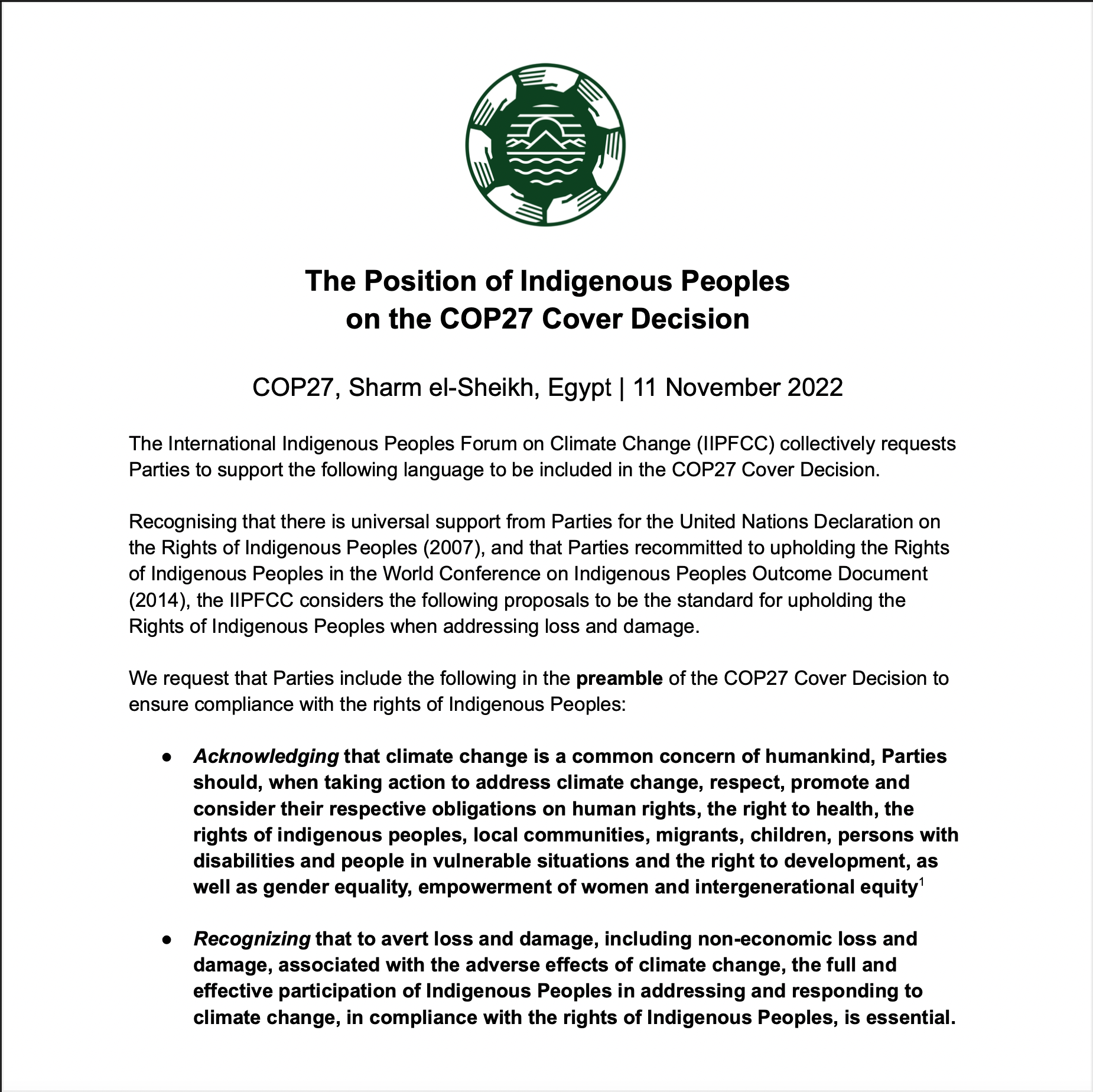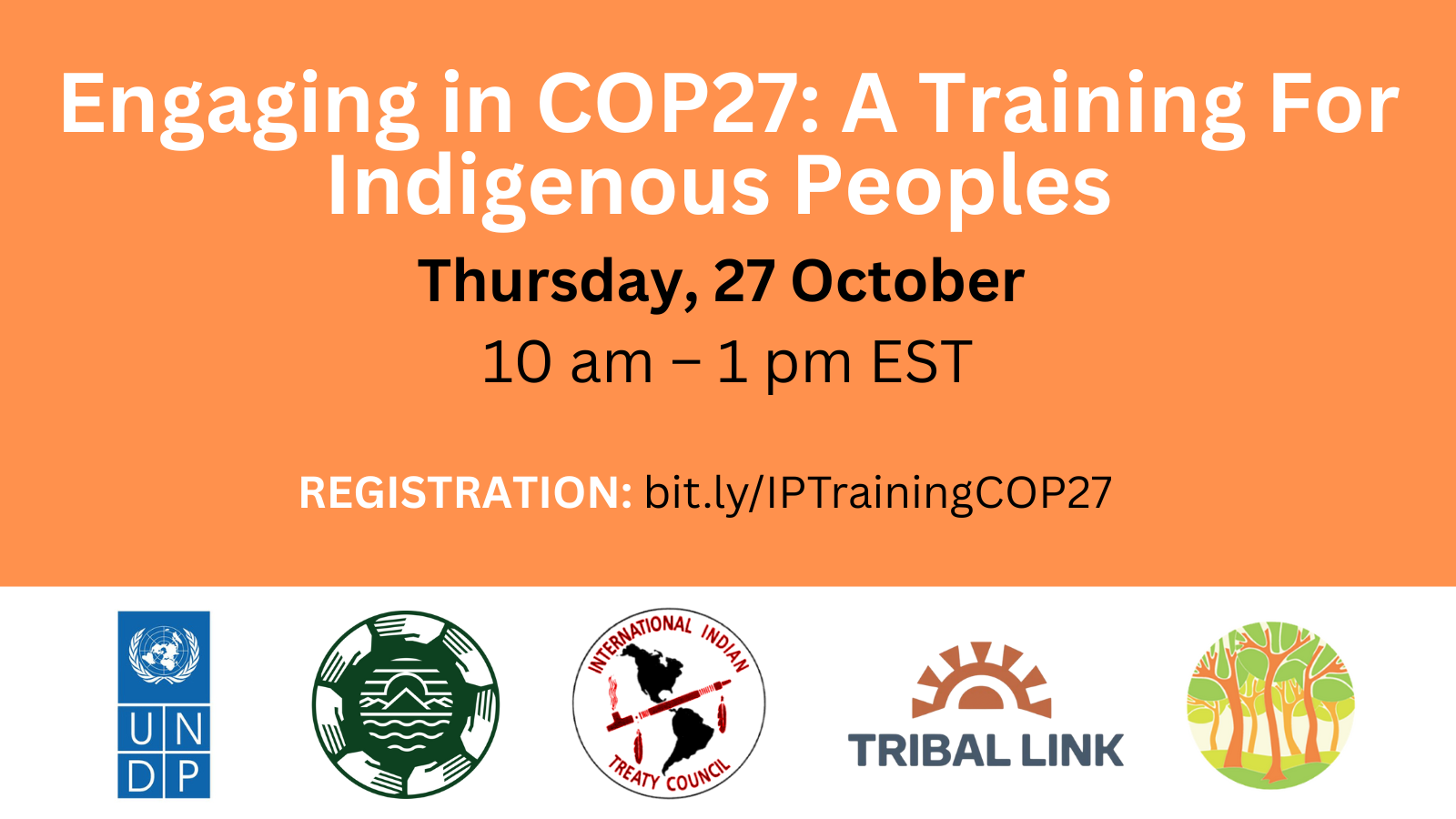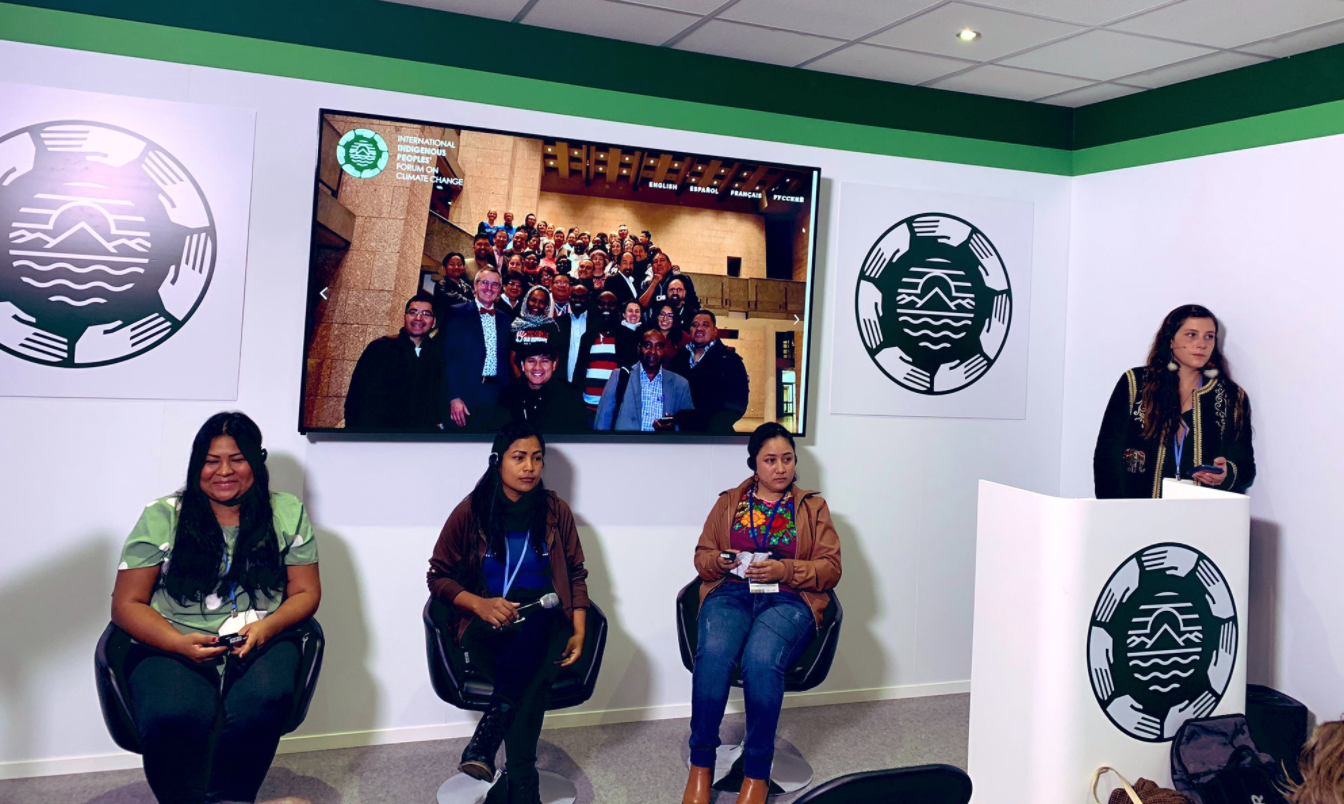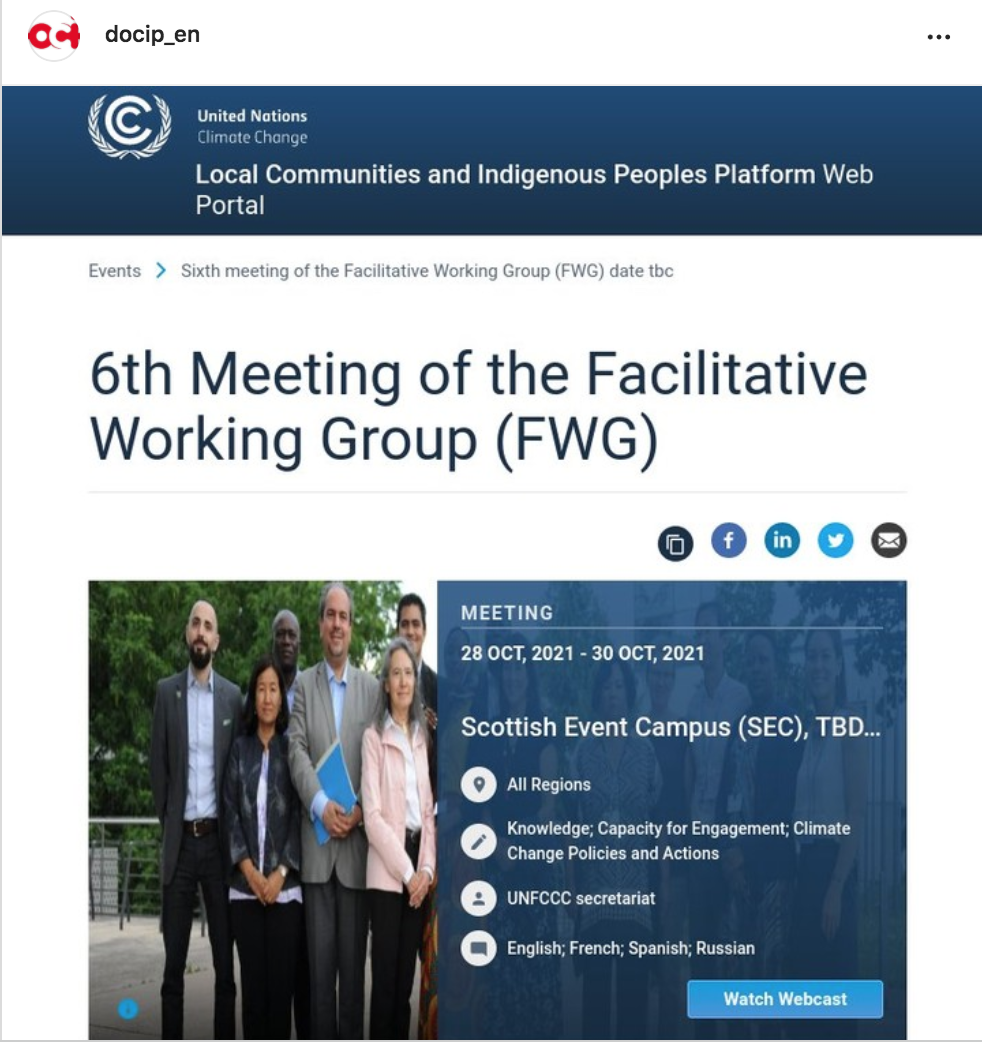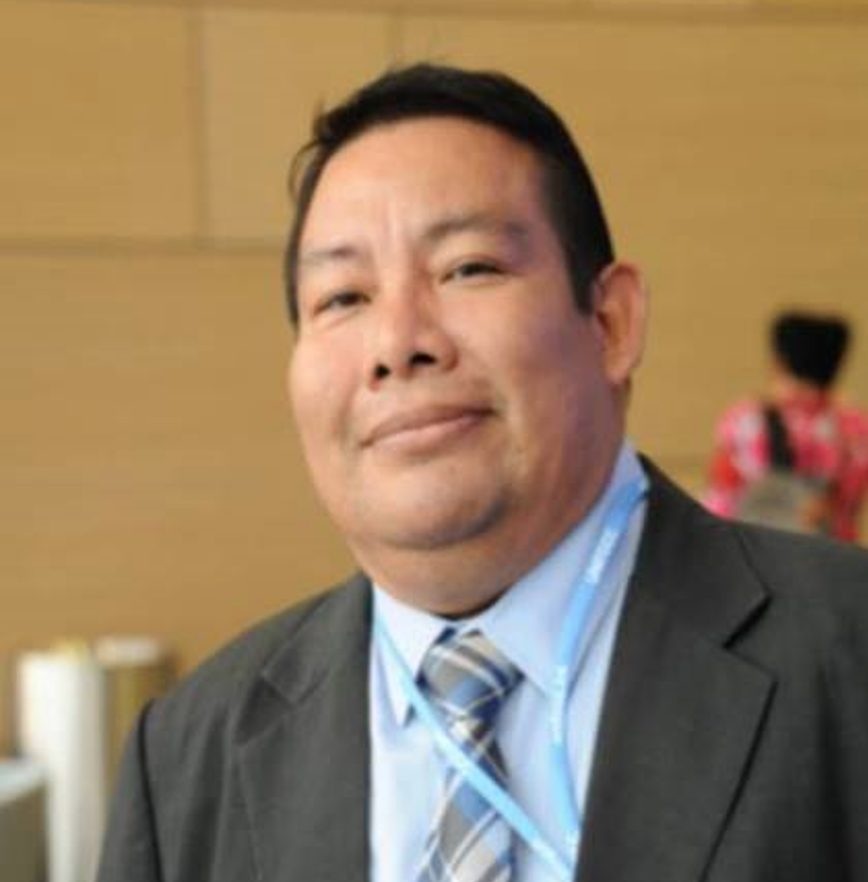Second annual high-level ministerial roundtable on just transition during COP 29
INTERNATIONAL INDIGENOUS PEOPLES FORUM ON CLIMATE CHANGE COP 29: OPENING STATEMENT
FORUM INTERNATIONAL DES PEUPLES AUTOCHTONES SUR LE CHANGEMENT CLIMATIQUE VERSION FINALE DE DOCUMENT DE PLAIDOYER POUR UNE « TRANSITION JUSTE »
« Les États consultent les peuples autochtones concernés et coopèrent avec eux de bonne foi par l’intermédiaire de leurs propres institutions représentatives, en vue d’obtenir leur consentement donné librement et en connaissance de cause, avant l'approbation de tout projet ayant des incidences sur leurs terres ou territoires et autres ressources… »
- Déclaration des Nations Unies sur les droits des peuples autochtones, Article 32, paragraphe 2
1. Le seul moyen de garantir la réalisation de l'objectif de l'Accord de Paris visant à maintenir l’augmentation de la température mondiale en dessous de 1,5°C, et de protéger ainsi les modes de vie, l'alimentation et les écosystèmes des peuples autochtones du monde entier, est que tous les États s'engagent, lors de la COP 28, à éliminer progressivement les combustibles fossiles de manière équitable et fondée sur les droits, et à assurer une transition juste et équitable vers des sources d'énergie durables et non fondées sur les émissions de carbone.
2. Les discussions actuelles pour une « transition juste » qui ont débuté à l’Organe subsidiaire de conseil scientifique et technologique (SBSTA en anglais) en juin 2023 sont basées sur des solutions et peuvent apporter une contribution substantielle à la réduction des gaz à effet de serre, à la prévention des pertes et des dommages, à la protection des écosystèmes de la planète, de la biodiversité et des modes de vie des peuples autochtones.
3. le terme « transition juste » et les critères qui régissent sa mise en œuvre n'ont pas encore été entièrement définis. Nous craignons que, à moins que la définition et les critères ne soient clarifiés et confirmés, et que les droits et les garanties environnementales ne soient fermement établis, les projets menés au nom d’une « transition juste » conduiront à un écoblanchiment de pratiques destructrices qui violent davantage les droits des peuples autochtones, de la même manière que les solutions « basées sur la nature » et « net-zéro » sont déjà promues et mises en œuvre.
4. Les droits, les perspectives, les systèmes de connaissances et les expériences vécues des peuples autochtones doivent être considérés et pris en compte dans les définitions, les critères et la mise en œuvre des projets et programmes de « transition juste ».
5. Les droits affirmés dans la Déclaration des Nations Unies sur les droits des peuples autochtones, y compris notamment les articles 12, 26 et 32, ainsi que l'engagement affirmé au paragraphe 11 du préambule de l'Accord de Paris, doivent fournir un cadre pour définir ce qui est « juste » à cet égard.
6. L'extraction de minéraux de transition tels que le lithium, le cuivre, le nickel, le chrome et l'hélium, la construction de méga-barrages, l'établissement de plantations d'huile de palme et d'autres monocultures et la construction de parcs éoliens industriels sont plusieurs exemples de « transition juste » réalisée sur les terres et territoires des peuples autochtones sans leur consentement préalable, libre et éclairé. Cela ne peut pas être défini comme une transition du « statu quo » et ces activités ne peuvent certainement pas être qualifiées de « justes ».
7. Conscient que la production alimentaire industrielle contribue considérablement à l’emission des gaz à effet de serre, incluant la dégradation des sols, la mono-culture et la déforestation, nous demandons la protection et la restitution d’une production alimentaire basée sur des pratiques agricoles écologiques, incluant les méthodes, connaissances et sciences prouvées des peuples autochtones, et l’abandon progressif de l’agriculture industrielle, comme élément essentiel d’une transition juste.
8. Les connaissances, la science et les pratiques éprouvées par le temps des peuples autochtones peuvent apporter une contribution substantielle aux discussions politiques et décisions en cours concernant une « transition juste » y compris l'intégration des technologies ancestrales ainsi que des nouvelles technologies durables mises en œuvre avec le consentement préalable, libre et éclairé des peuples autochtones touchés. Les peuples autochtones doivent donc participer pleinement à toutes ces discussions aux niveaux national et international.
INTERNATIONAL INDIGENOUS PEOPLES FORUM ON CLIMATE CHANGE FINAL ADVOCACY PAPER ON “JUST TRANSITION” FOR UNFCCC COP 28
“States shall consult and cooperate in good faith with the indigenous peoples concerned through their own representative institutions in order to obtain their free and informed consent prior to the approval of any project affecting their lands or territories and other resources…”
- UN Declaration on the Rights of Indigenous Peoples Article 32 paragraph 2
1. The only way to ensure achievement of the Paris Agreement Goal of 1.5 C global temperature rise, thereby limiting the adverse impacts on the ways of life, food and eco-systems of Indigenous Peoples around the world, is for all states to commit to an equitable and rights-based phase out of fossil fuels at COP 28, coupled with a commitment to a fair and just transition to sustainable, non-carbon-based energy sources.
2. Current discussions of “Just Transition” which began at SBSTA in June 2023 are solution-based and can make a substantive contribution to the reduction of greenhouse gasses, prevention of loss and damage, protection of the planet’s eco-systems, biodiversity, and Indigenous Peoples ways of life.
3. The term “Just Transition” and the criteria that govern its implementation have not yet been fully defined. We are concerned that unless the definition and criteria are clarified and confirmed, and rights and environmental safeguards are firmly established, projects carried out in the name of “Just Transition” will lead to greenwashing of destructive practices that further violate the rights of Indigenous Peoples, similar to the way “Nature-based” and “net-zero” solutions are being promoted and implemented.
4. Indigenous Peoples’ rights, perspectives, knowledge systems and lived experiences must be considered and taken into account in the definitions, criteria and implementation of “Just Transition” projects and programs.
5. The rights affirmed in the UN Declaration on the Rights of Indigenous Peoples, including inter alia Articles 12, 26, and 32, as well as the commitment in Preambular Paragraph 11 of the Paris Agreement, must provide a framework for defining what is “just” in this regard.
6. The mining of transition minerals such as lithium, copper, nickel, chromium and helium, constructing of mega-dams, establishing palm oil and other mono-crop plantations, and building industrial wind farms are several examples of “Just Transition” being carried out on Indigenous Peoples’ lands and territories without their Free Prior and Informed Consent. This cannot be defined as a transition from “business as usual” and these activities certainly cannot be called “just”.
7. Recognizing that industrial agriculture also makes a substantial contribution to the creation of greenhouse gasses, including through soil degradation, mono-cultivation and deforestation, we call for the protection and restitution of agroecology based on Indigenous Peoples ancestral practices, knowledge and science, and a phase out of industrial agricultural practices as an essential component of “Just Transition.”
8. Indigenous Peoples’ knowledge, science, and time-tested practices can make substantial contributions to ongoing and current policy discussions and decisions regarding “Just Transition” including integration of ancestral as well as new sustainable technologies implemented with the Free Prior and Informed consent of the impacted Indigenous Peoples. Indigenous Peoples must therefore be full participants in all such discussions at the national and international levels.
COP28 Indigenous Peoples Dialogue with the UN Climate Change High-Level Champions, the COP 28 Presidency, and the UNFCCC Secretariat
In line with the celebration of the Indigenous Peoples Day at COP28 the @iipfcc participated in the COP28 Indigenous Peoples Dialogue with the UN Climate Change High-Level Champions, the COP 28 Presidency, and the UNFCCC Secretariat on 5 December in the Blue Zone at the Expo City Dubai.
Indigenous Peoples are key agents of change for climate action and for ensuring a just transition for all. Growing evidence shows that Indigenous Peoples values, knowledge, practices, and ways of living are instrumental for environmental conservation, maintaining biodiversity, furthering green jobs, enhancing resilience, and addressing climate change.
The Dialogue focused on how collective action can support both Indigenous Peoples inclusion in just transition plans and highlight clear examples of how Indigenous Peoples are already leading and contributing to just and inclusive transitions.
@indigenousclimateaction @ndncollective @iiyf.climatechange @treaty_council @emairena @hindououmar
Opening Statement by the IIPFCC at COP28
Pema Wangmo Lama Mugum, National Indigenous Women's Federation
On Day 1 of COP28, Pema Wangmo Lama Mugum, an Indigenous Youth activist from the Mugum Indigenous Nations in Asia, from the National Indigenous Women's Federation - NIWF NEPAL read the International Indigenous Peoples Forum on Climate Change opening statement.
“We commit to working with States to implement real solutions based on our knowledge, practices, time-tested sciences, reciprocity with the natural world and Mother Earth, and the full exercise of our rights. Our collective survival is at stake and our children and future generations require action without delay.” ~ Pema Wangmo Lama Mugum, Mugum Indigenous Nations
> Watch the full opening statement here: https://www.youtube.com/live/kh872ctTc10?si=o8HCzlyuIQqmN4LH
Download English version
The Indigenous Peoples' Pavilion Now Open to the Public in Dubai
The Indigenous Peoples' Pavilion hosted by IIPFCC opened to the public today at 10 am (UAE)/10 pm (PST):
Check out the Indigenous Peoples' Pavilion weekly and daily program: https://www.iipfccpavilion.org/cop28-programme
Indigenous Peoples Pavilion and Launch of Call-for-Sessions
Good morning relatives,
We are pleased to announce that the Indigenous Peoples Pavilion at COP 28 in Dubai has been confirmed! We have been allocated 180 m2 in the Blue Zone in a pre-existing building. The building will also have a separate office. We have formed a committee with representatives from all regions that will be responsible for the selection of proposals and the design.
Thanks to this group, we are excited to launch the Call for Sessions for the Indigenous Peoples Pavilion. We invite Indigenous Peoples, Indigenous organisations, support organisations, and Parties to submit events – such as presentations, policy dialogues, roundtables and publication launches – and artistic demonstrations – such as images and videos – by 18 September 2022. Please note that those wishing to present a session in person need UNFCCC accreditation ('a badge').
For more information, please see the call for sessions here
If you have any questions, please contact Rosario Carmona (rosariocarmonayost@gmail.com).
The position of Indigenous Peoples in relation to the Cover Decision of COP27
The position of Indigenous Peoples in relation to the Cover Decision of COP27, which is in the hands of the COP Presidency.
Calling Egypt to:
- Build upon the progress made
- Refer to the eleventh preambular paragraph of the Paris Agreement
- Include a new preambular paragraph drafted by Indigenous Peoples
Statement of the IIPFCC at the Joint Opening Plenary at COP27
Statement of the International Indigenous Peoples Forum on Climate Change (IIPFCC),
Joint Opening Plenary at COP27, Sharm El Sheikh, Egypt November 6, 2022
The IIPFCC statement was delivered by youth representative, Mr. Nourene Ahmat Yaya
Climate change is a matter of life and death. State actions have fallen far short, Greenhouse gas emissions and global temperatures are increasing, threatening genocide for Indigenous Peoples in Africa, the Arctic, Coastal, Small Island and all other ecosystems.
Indigenous Peoples’ rights are inherent, collective and internationally recognized, including rights to life, self-determination, lands and territories, food systems, and free prior and informed consent. We will not allow these rights to be diminished by conflating us with minorities, vulnerable groups or local communities.
We have the right to full and direct participation, including our youth, women, persons with disabilities and knowledge holders, in all UNFCCC bodies and processes including the new Article 6 grievance mechanism and the creation of a new financing mechanism accessible to Indigenous Peoples from all regions and eco-systems.
Carbon markets and offsets, geo-engineering, “Net Zero” frameworks, “Nature-based solutions”, “ecosystem services” do not cut emissions and are new forms of colonization.
The NDC’s must include clear indicators for drastic reduction of greenhouse gas emissions, including the accelerated phase out of fossil fuels in order to maintain the 1.5-degree Paris commitment. The Paris Agreement also commits States to respect, promote and consider their obligations to the rights of Indigenous Peoples in climate action. The Global Stock Take must focus on implementation of these commitments.
We commit to real solutions based on our knowledge, practices and time-tested sciences, and the full exercise of our rights, at the United Nations and in our own territories. We will continue to work with you for the survival of our children, and yours.
Thank you.
Note: This statement presented yesterday (in Arabic) by an Indigenous representative from the African Region last night in the plenary at formal opening of the COP 27 in Sharm el-Sheikh Egypt. The statement was limited to 2 minutes and a longer version was submitted to post. The IIPFCC statement was adopted after several hours of discussion by the entire Indigenous Peoples Caucus during preparatory meeting this past weekend. More than 200 IPs representatives from all regions are present.
Indigenous Peoples' Caucus Preparatory Meetings 5th & 6th November
The Indigenous Peoples’ Caucus Preparatory meeting will take place from the 09:00-19:00 on Saturday 5th November, and 09:00 - 18:00 on 6th November, at the Kalimera Restaurant of the Marina Hotel. Located with a view of Naama Bay, we have reserved an area which is partially outside. The venue is accessible for mobility impaired participants. If you have any accessibility needs, please contact us in advance or on arrival.
Address: Kalimera Restaurant at the Marina Hotel, Naama Bay, Al Sultan Qabous-Mashaba, 46628, Egypt (Google Maps: https://goo.gl/maps/nYKNSDS6qifFiQAZ7 )
Please see the attached documents below for the draft agenda.
La reunión preparatoria del Cónclave de los Pueblos Indígenas tendrá lugar de 09:00 a 19:00 horas el sábado 5 de noviembre, y de 09:00 a 18:00 horas el 6 de noviembre, en el Restaurante Kalimera del Hotel Marina. Situado con vistas a la bahía de Naama, hemos reservado una zona parcialmente exterior. El lugar es accesible para los participantes con problemas de movilidad. En caso de necesitar algún tipo de accesibilidad, póngase en contacto con nosotros con antelación o a su llegada.
Dirección: Restaurante Kalimera en el Hotel Marina, Bahía de Naama, Al Sultan Qabous-Mashaba, 46628, Egipto
(Google Maps: https://goo.gl/maps/nYKNSDS6qifFiQAZ7 )
En los documentos adjuntos encontrará el proyecto de orden del día.
8th Meeting of the Facilitative Working Group (FWG)
The 8th Meeting of the Facilitative Working Group (FWG 7) will take place from 1-4 November 2022 at Zone D Meeting Room 5 of COP 27 venue in Sharm El-Sheikh, Egypt. See the agenda for more details: Click here.
For further information contact the LCIPP team via lcipp@unfccc.int
ENGAGING IN COP27: A TRAINING FOR INDIGENOUS PEOPLES
ENGAGING in COP27: A Training For Indigenous Peoples
Thursday, 27 October
10am – 1pm EST
The following presentations will take place, with an opportunity for questions
and discussion on each topic:
History of Indigenous Peoples’ Engagement and Opportunities to Engage
in the UNFCCC: Andrea Carmen, Executive Director, International Indian
Treaty Council and former Co-Chair, Facilitative Working Group of the Local
Community and Indigenous Peoples PlatformEntry Points into UNFCCC Negotiations and Agenda for COP27: Graeme
Reed, Co-chair, International Indigenous Peoples Forum on Climate Change;
Climate Adviser, Assembly of First Nations, CanadaNationally Determined Contributions (NDCs) and COP27 101: Sameera
Savarala, Programme Specialist, NDCs and Negotiations, UNDP Climate
PromiseClosing remarks: Rochelle Diver, International Indian Treaty Council
Simultaneous interpretation available in Spanish, French, Portuguese
REGISTER HERE
IIPFCC / FIPICC Pavilion: Call for Proposals at COP 27 / Convocatoria de Propuestas para la COP 27 / Call for proposals for COP 27
*Español más abajo / En français ci-dessous
The International Indigenous Peoples Forum on Climate Change (IIPFCC) is now accepting proposals for events and exhibits to be held at the Indigenous Peoples' Pavilion during COP27 in Sharm el-Sheikh, Egypt. The Pavilion, located in the Blue Zone, will facilitate the effective representation of Indigenous Peoples by communicating and amplifying their messages during the COP27 negotiations. It will also serve as a learning and knowledge exchange center on Indigenous Peoples' issues in the climate context, showcasing solutions based on Indigenous knowledge. To this end, it will convene online and hybrid events such as presentations, policy dialogues and panel discussions.
This Open Call for Proposals invites Indigenous Peoples, Indigenous organizations, supportive organizations, and Parties to submit the events they would like to host at the Pavilion by September 12, 2022. For those interested, please fill complete the Call-for-Sessions (https://forms.gle/hAmaNuXmLw6JMGaEA). For questions, please reach out to Rosario Carmona (rosariocarmonayost@gmail.com).
===============
El Foro Internacional de Pueblos Indígenas sur Cambio Climático está aceptando propuestas de events y exposiciones a realizarse en el Pabellón de los Pueblos Indígenas during COP27 in Sharm el-Sheikh, Egypt. El Pabellón will be planned and programmed by a team of indigenous representatives from the FIPICC region: Africa, el Ártico, Asia, América Latina y el Caribe, América del Norte, el Pacífico y Rusia y Europa del Este.
El Pabellón, located in the Zona Azul, will be a platform visible to communicate and amplify the messages of the indigenous pueblos during the COP27 negotiations. Its purpose is to facilitate the effective representation of the indigenous pueblos, providing a meeting space dedicated to coordinating the communication and promotion strata, as well as also amplifying the solutions of the indigenous pueblos before the climatic climate basadas en el conocimiento indígena. También will serve as a center of learning and interaction of conocimientos on the problems of the indigenous pueblos in the climatic context. Para ello, convocará events como presentationaciones, diálogos políticos, mesas redondas, lanzamientos de publicaciones, etc. Estos events serán tanto presenciales como hybridos,
Al igual que en años anteriores, el Pabellón de los Pueblos Indígenas will attract high level attention, with ministers of Estado, ministers and other functionaries and political leaders, medios de comunicación mundiales y miembros del public in general que visitarán el espacio y participarán en su programa.
Esta convocatoria para propuestas invita a los pueblos indigenas, las organizaciones indígenas, las organizaciones solidarias y las Partis a presentar propuestas de events antes del 16 de septiembre de 2022. the UNFCCC ("una credential").
If you preguntas, póngase in contacto con rosariocarmonayost@gmail.com
==================================
Le Forum international des peuples autochtones sur le changement climatique (FIPACC) accepte désormais les propositions d'événements et d'expositions qui se tiendront au Pavillon des peuples autochtones pendant la COP27 à Sharm el-Sheikh, en Égypte. Le Pavillon, situé dans la Zone Bleue, facilitera la représentation effective des Peuples Autochtones en communiquant et amplifiant leurs messages pendant les négociations de la COP27. Il servira également de centre d'apprentissage et d'échange de connaissances sur les questions relatives aux peuples autochtones dans le contexte climatique, en présentant des solutions fondées sur le savoir autochtone. À cette fin, il organisera des événements en ligne et hybrides, tels que des présentations, des dialogues politiques et des tables rondes.
Cet appel à propositions ouvert invite les peuples autochtones, les organisations autochtones, les organisations de soutien et les parties à soumettre les événements qu'ils souhaitent organiser au Pavillon avant le 12 septembre 2022. Les personnes intéressées sont invitées à remplir l'appel à propositions (https://forms.gle/hAmaNuXmLw6JMGaEA). Pour toute question, veuillez contacter Rosario Carmona (rosariocarmonayost@gmail.com).
Live stream from the Indigenous Peoples Pavilion Available
The Indigenous Peoples Pavilion is located in the Blue Zone of the COP26 Glasgow campus. To attend in person, you must have UNFCCC accreditation to the Blue Zone. Events at the Indigenous Peoples Pavilion will take place in Events Hall D. There is level entry to the Pavilion from the main floor. Inside the pavilion, seating is available and is spaced to maintain physical distancing for COVID-19 safety.
Most Pavilion events for the duration of COP26 will be live-streamed to facilitate participation from around the world.
Please check event details ahead of time to ensure your session will be live-streamed and to view interpretation options. We encourage registering and joining events via Zoom where possible to access interpretation and audience engagement functions.
You can watch the live broadcast, click here.
Pavilions operation hours: Monday, 1 November to Friday, 12 November: 08:00 – 22:00 hrs
Facilitative Working Group on the Local Communities and Indigenous Peoples
Don't miss the last day of the 6th meeting of the Facilitative Working Group on the Local Communities and Indigenous Peoples Platform tomorrow!
✅ Date: Saturday, October 30, 2021
✅ Time: 8:00 AM - 2:30 PM UTC
✅ Live transmission: https://bit.ly/3pHO6yo
✅ More information: https://bit.ly/3Ckiken
✅ Languages: English, Spanish, French, Russian
Information to participants of the sixth meeting of the facilitative working group from 28 to 30 October 2021
In preparation for the event that will take place in Glasgow, we would like to provide you with the following general information:
Date and venue: From 28 to 30 October at the Side Event room 1, Room Loch Lomond _ located at the Armadillo – Clyde Auditorium.
FWG6 webpage: You will find the agenda with related documents and additional information for the meeting.
Interpretation: French, Spanish and Russian will be provided.
Connectivity for virtual participation, guidelines below:
Access to this meeting is restricted to invited users. Participants to receive an invitation soon.
All delegates interested in joining remotely MUST have completed the Virtual ID check OR have acquired a COP26 badge at the venue in Glasgow. To find and join their meetings they will need to login to the COP26 platform https://cop26platform.unfccc.int.
The meeting will be published in the COP26 platform schedule. Delegates who are invited will be able to Join the meeting directly from this schedule.
Delegates will be able to request the floor and once given the floor they can unmute and address the meeting. We encourage participants to review the provided training material before joining the meeting. Training materials can be found on the COP26 platform.
Badging for in-person participation: You need to collect your FWG6 badge at the registration counter first thing before you are allowed to access the venue.
Below is also some important information regarding your travels and entry to the United Kingdom. Additionally, attached is document produced by the UK COP Presidency that outlines guidance on how to plan your journey to UNFCCC COP26 for those who are joining physically in-person.
Covid-19 testing pre and post arrival:
Pre departure: All participants at COP26 must be able to provide evidence of a negative Covid-19 test taken in the 72 hours before departing to the UK. You may be asked to show this before boarding the service departing to the UK.
Passenger locator form:
All arrivals to the UK, including those attending COP26 must complete a passenger locator form up to 48 hours before they arrive in the UK. You can find the passenger locator form via this link here.
The passing of our dear colleague Estebancio Castro-Diaz
Para la versión en español: Haga clic aquí
Estebancio Castro-Diaz, Kuna
On behalf of the International Indigenous Peoples Forum on Climate Change (IIPFCC), it is with great sadness that we acknowledge the passing of our dear friend, brother, colleague, and mentor Estebancio Castro-Diaz.
Estebancio is a Kuna leader who has been involved in the international movement for climate justice and rights of Indigenous Peoples for decades. He played an essential role as Focal Point of the Indigenous Peoples Constituency (the Caucus) as well as a member of the Facilitative Working Group of the Local Communities and Indigenous Peoples Platform (‘The Platform’), representing the Latin America and the Caribbean UN Indigenous socio-cultural region. Put simply, indigenous participation within the UN Framework Convention on Climate Change (UNFCCC) would not be as successful without Estebancio having participated for so long. This has been recognized by the Executive Secretary, the Chair of the SBSTA, and all Constituency groups.
This legacy is difficult to meaningfully articulate in words. Over the last week, hundreds of stories and memories of Estebancio have been shared over email and video calls. Many remember him as an exceptionally skilled diplomat who not only took his responsibilities to advocate for Indigenous Peoples around the globe to heart, but also developed a unique style that included humility, dedication, and laughter. He was steadfast in his commitment to protecting Mother Earth, highlighted by his dedication into the late hours of the night and the final hours of these large conferences. But no matter the seriousness of the situation, he is remembered to have always brought good humour, a cheeky smile, and deep empathy.
Many old and new members of the IIPFCC, and the broader international Indigenous movement, credit Estebancio’s generous teaching with the skills, knowledge, and diplomacy required to continue the legacy of making space for Indigenous Peoples and Nations in state-led processes. He was welcoming to all Indigenous Peoples entering the space, but took extra care in supporting the participation of Indigenous Youth - many who credit their understanding of these complex processes to him and his willingness to answer questions, listen, and direct with a gentle hand.
A core part of this work for Indigenous Peoples is being a good ancestor to those future generations. As Estebancio makes his journey to being an ancestor, we honour, from all seven regions, his extensive legacy for Indigenous Peoples worldwide. We are privileged to carry his spirit with us always.
We send our love and care to Estebancio’s family and Kuna Yala in this time of grief and loss.
Rest in power, dear brother Estebancio.
The Last Goodbye
Receiving news of a brothers passing
Feeling them in the morning light
next to a fresh fire
Snowflakes, perfect stars shining down on me.
Feeding the fire
Saying thank you brother - for all the laughter you gave.
For all that you shared, for your spirit and endurance.
For all those years you paved a way for us to continue on.
The fire running through the day.
Oh, how you will be missed!
By Jannie Staffansson
Indigenous Peoples Preparatory Caucus Meeting - Nov 30 (1-5pm) and Dec 1 (9-6:30pm) at the HOTEL MADRID CHAMARTIN
[español sigue]
Aanii Indigenous relatives,
Please find attached the draft Agenda for the upcoming Preparatory Caucus Meeting on November 30 (1-5pm) and Dec 1 (9-6:30pm). All Indigenous Peoples and their organizations are invited to attend. The meeting will be held at the Hotel Madrid Chamartin (Calle Mauricio Ravel, 10, 28046 Madrid, Spain). The direction from IFEMA to the hotel are attached.
We also remind everyone that the Call for Sessions for the Indigenous Pavilion is still open at this link: https://docs.google.com/forms/d/e/1FAIpQLScaxda6DnLz4XXByN6g7xXgn3bvRWZVW4PiQleQfcclaBEHjw/viewform?fbclid=IwAR3CncmczLlkdDkKI0MrKqBsPUjTwRmK32aYMuCiuzA_GMaK5_Ie_6rlrBU. Please submit your proposals by latest November 27. In preparation for this space, if there is any decoration or flags that you would like to bring to decorate the space, please do so.
________________________________________________________________________
Favor de encontrar adjunta la Agenda para la próxima Junta de la Asamblea Preparatoria en Noviembre 30 (1-5pm) y Diciembre 1 (9-6:30pm) Todas los Pueblos Indígenas y sus organizaciones son invitados a asistir. La junta tendrá lugar en el Hotel Madrid Chamartin (Calle Mauricio Ravel, 10, 28046 Madrid, Spain). La dirección del IFEMA al hotel donde la junta tendra lugar esta adjunta.
También les recordamos que la Convocatoria para Sesiones en el Pabellón Indígena siguen abiertas aqui: https://docs.google.com/forms/d/e/1FAIpQLScaxda6DnLz4XXByN6g7xXgn3bvRWZVW4PiQleQfcclaBEHjw/viewform?fbclid=IwAR3CncmczLlkdDkKI0MrKqBsPUjTwRmK32aYMuCiuzA_GMaK5_Ie_6rlrBU
Favor de mandar sus propuestas a mas tardar Noviembre 27. En preparación para este espacio, si tienen algunas decoraciones o banderas que quisieran contribuir para decorar el espacio, por favor no duden en traerlo.
……………………………
With warm regards,
IIPFCC Co-Chairs and Focal Points
Documents / Documentos
IFEMA to TRYP Madrid Chamartin







